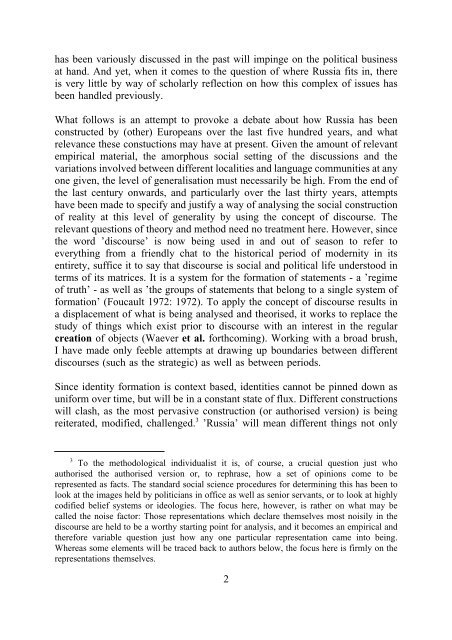RUSSIA AS EUROPE'S OTHER Iver B. Neumann European ...
RUSSIA AS EUROPE'S OTHER Iver B. Neumann European ...
RUSSIA AS EUROPE'S OTHER Iver B. Neumann European ...
You also want an ePaper? Increase the reach of your titles
YUMPU automatically turns print PDFs into web optimized ePapers that Google loves.
has been variously discussed in the past will impinge on the political business<br />
at hand. And yet, when it comes to the question of where Russia fits in, there<br />
is very little by way of scholarly reflection on how this complex of issues has<br />
been handled previously.<br />
What follows is an attempt to provoke a debate about how Russia has been<br />
constructed by (other) <strong>European</strong>s over the last five hundred years, and what<br />
relevance these constuctions may have at present. Given the amount of relevant<br />
empirical material, the amorphous social setting of the discussions and the<br />
variations involved between different localities and language communities at any<br />
one given, the level of generalisation must necessarily be high. From the end of<br />
the last century onwards, and particularly over the last thirty years, attempts<br />
have been made to specify and justify a way of analysing the social construction<br />
of reality at this level of generality by using the concept of discourse. The<br />
relevant questions of theory and method need no treatment here. However, since<br />
the word ’discourse’ is now being used in and out of season to refer to<br />
everything from a friendly chat to the historical period of modernity in its<br />
entirety, suffice it to say that discourse is social and political life understood in<br />
terms of its matrices. It is a system for the formation of statements - a ’regime<br />
of truth’ - as well as ’the groups of statements that belong to a single system of<br />
formation’ (Foucault 1972: 1972). To apply the concept of discourse results in<br />
a displacement of what is being analysed and theorised, it works to replace the<br />
study of things which exist prior to discourse with an interest in the regular<br />
creation of objects (Waever et al. forthcoming). Working with a broad brush,<br />
I have made only feeble attempts at drawing up boundaries between different<br />
discourses (such as the strategic) as well as between periods.<br />
Since identity formation is context based, identities cannot be pinned down as<br />
uniform over time, but will be in a constant state of flux. Different constructions<br />
will clash, as the most pervasive construction (or authorised version) is being<br />
reiterated, modified, challenged. 3 ’Russia’ will mean different things not only<br />
3 To the methodological individualist it is, of course, a crucial question just who<br />
authorised the authorised version or, to rephrase, how a set of opinions come to be<br />
represented as facts. The standard social science procedures for determining this has been to<br />
look at the images held by politicians in office as well as senior servants, or to look at highly<br />
codified belief systems or ideologies. The focus here, however, is rather on what may be<br />
called the noise factor: Those representations which declare themselves most noisily in the<br />
discourse are held to be a worthy starting point for analysis, and it becomes an empirical and<br />
therefore variable question just how any one particular representation came into being.<br />
Whereas some elements will be traced back to authors below, the focus here is firmly on the<br />
representations themselves.<br />
2

















